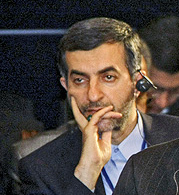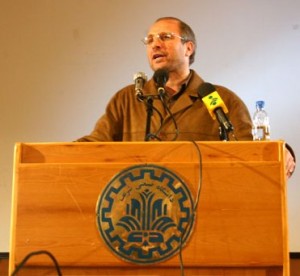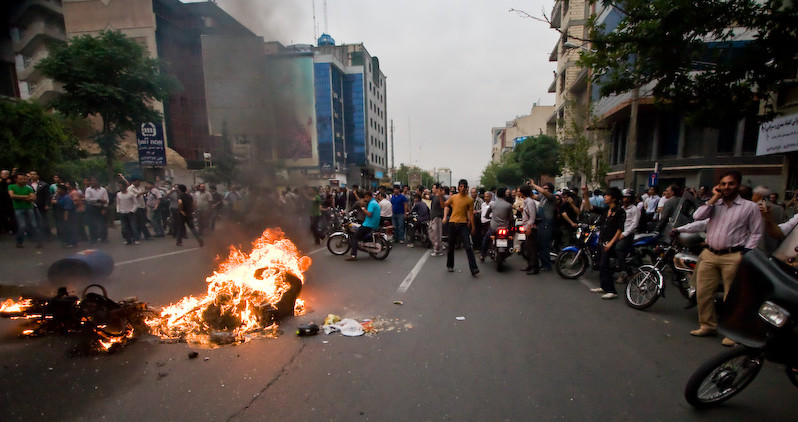Barring any major constitutional changes over the next several months, Mahmoud Ahmadinejad will soon be forced to step down as the president of Iran. For the past eight years, Ahmadinejad has been viewed through countless lenses: champion of the poor (at the risk of inflation, he has provided food and gasoline subsidies for the nation’s poor), puppet of the Supreme Leader Ayatollah Ali Khamenei (his self-proclaimed spiritual mentor), greatest threat to Israel, and most recently a quasi-heretic for consoling Chávez’s mother (a female!) at her son’s funeral.
It is unclear whether Ahmadinejad will make a quiet exit, or remain a major power-player in Iranian politics after his presidency. Given his recently announced intentions to engage in one-on-one talks with the U.S. if economic sanctions are eased (after the elections), something tells me he’s not going to purchase a 5-acre plot in the hills of Zarabad and quietly live off the fat of the land. If he does stay in politics, it is hard to tell exactly what his influence would bring. Nevertheless, with Ahmadinejad out of office, Iranians are tasked with electing another leader on June 14.
In the interest of understanding why these elections matter, it is necessary to dissect the Iranian political process. The Republic of Iran is a theocracy, specifically an Islamic Republic. After the secular Shah was overthrown in 1979, the new regime no longer valued the separation of “Mosque and State.” The Iranian parliament, however does not derive power from religious authority. The parliament presides over secular affairs, ranging from business, education and welfare to dismissing cabinet ministers, while Ayatollah Khamenei, the supreme religious leader, controls political appointments, interprets the constitution through the filter of Islamic principles, and assigns diplomatic priorities. While Khamenei does not directly control economic decisions, he has been vocal in saying that increased support for “domestic industrial production” can counter Western sanctions. On the Iranian New Year, he faulted the old Rafsanjani administration for setting the precedent of exorbitant reliance on oil revenues and failing to diversify the economy. As the country’s foremost religious and spiritual authority, the Supreme Leader Grand Ayatollah Khamenei has the most recognizable face in Iran. Passing freely between a world of silent arbitration and one of active “diplomacy,” he controls intelligence operations, war declarations, and appoints the heads of the state-controlled radio and television networks. Although he has attempted in recent years, according to political analyst Karim Sadjadpour, “…to cultivate the image of a magnanimous guide above the political fray,” Khamenei is certainly a powerful political and economic actor. In Iran’s largely state-managed economy, the Ayatollah authorizes the spending of everything from oil revenue to the millions of dollars in individual religious donations his office receives throughout the year. He has also influenced foreign policy decisions in numerous arenas, particularly in relations with the West. Just last month, Khamenei himself rejected direct, bilateral negotiations with the United States over Iran’s nuclear program, stating, “Some rejoice at the offer of negotiations … (but) negotiations will not solve anything.” He then added, “I am not a diplomat but a revolutionary.”
According to the Iranian Constitution, nearly every decision that is made by the parliament must be approved by the Supreme Leader and his Guardian Council, a 12-member committee comprised of six theologians appointed by Khamenei and six jurists specializing in non-Islamic law, who are nominated by the judiciary and officially approved by parliament . In addition to interpreting the Constitution, the Council approves or rejects candidates’ bids for the presidency, a position ultimately determined by direct, popular vote. From May 7 through June 7 this ye y tar, official registration of candidates will take place, after which time the Council will make their official approvals or denials of bids. The last presidential election was marred by violent protests, and accusations of election fraud by supporters of Mir-Hossein Mousavi, Ahmadinejad’s opponent. The political chaos ended in the Guardian Council’s affirmation of the election results. Bear in mind that, just as the Council certified the 2009 contested elections, effectively putting Ahmadinejad in power despite strong charges of election corruption, its members will again have the final say in June regardless of what citizens may claim. Because of his power over the aforementioned Guardian Council members, the Ayatollah indirectly controls which names end up on the ballots. His explicit support for or denunciation of candidates works counterproductively toward his goal of being perceived as “above it all.” Since the Ayatollah and his religious cohorts have a large amount of influence over the election as well as many other policy areas, the new president he must either learn to coexist with the reality of the Iranian status quo or discover an unprecedented way of charting his own path independent of the Ayatollah’s.
As the world looks on with a mixture of anxiety, excitement and uncertainty towards Iran’s electoral horizon, it is crucial that we remind ourselves of the president’s important yet limited role in Iranian politics. The United States is constantly monitoring Iran, wary of its nuclear developments. The next president, however, is not the sole factor that will determine whether we see a more or less aggressive Iran in the coming years. Ahmadinejad’s powerful rhetoric, such as his forceful anti-Israel threats, one might notice, was far removed any drastic actions in reality. Constitutionally, the president may preside over the National Security Council (which controls the nuclear program), but he is not commander-in-chief of the armed forces and the decision to enrich uranium above weapons-grade concentration levels lies, again, with the Supreme Leader. The president can neither veto policy nor issue “executive orders.” He may not revise the constitution, a task the Supreme Leader controls indirectly through appointments to the Council for Revision of the Constitution (which must be supported by a national referendum). Nonetheless, the president may present legislation to be discussed by Parliament, appoint cabinet ministers, set the national tone on issues like foreign policy, and execute the national budget.
Despite its weakness relative to the Supreme Leader’s role, the presidency of Iran should not be misconstrued as a merely nominal position. As candidate Hooshang Amirahmadi says, the Grand Ayatollah should not be misunderstood as “God on Earth.” The next president will have a significant role to play in establishing the executive branch’s sentiment on topics like Iran’s relationship with Israel and the West, the modernization of infrastructure, and the direction of social policies pertaining to the rights of women and tolerance of homosexuals. He will also manage the country’s efforts to combat the effects of crippling inflation and economic sanctions, and address the issue of primary concern for many Iranian citizens: unacceptably high youth unemployment. Iran is a nation of young people, as citizens under 30 years of age comprise nearly 60 percent of Iran’s population. This demographic will be crucial this election season.
Now that we understand a bit about the system and current sociopolitical tensions, it’s time to meet the players. Each of the following candidates has differing views as well as varying levels of support from within the Iranian political and religious establishment. While there are over twenty candidates who have already announced their intention to run (and dozens more potential candidates), these three candidates are crucial to understanding the diversity of Iranian politics.

Esfandiar Mashaei: “The Underdog”
Esfandiar Mashaei has a background in the Intelligence Ministry, as well as the Social Affairs Department of the Interior Ministry. Mashaei is Ahmadinejad’s Chief of Staff and top advisor. Rarely seen apart, Mashaei is the “Silvio” to Ahmadinejad’s “Tony,” the “Robin” to Ahmadinejad’s “Batman”, the “Garfunkel” to…the…that’s enough. Conservatives have criticized Mashaei for his comments that Iran is a friend to the Israeli people, though he has denied responsibility for these comments and Ahmadinejad has defended him. His “deviant” (as the Ayatollahs have referred to them) cultural views, including emphasizing the societal and political benefits of pre-revolution Iran, have earned him a place on Ayatollah Khamenei and Ayatollah Mesba Yazdi’s least-wanted list. Ayatollah Yazdi has accused Mashaei of working to actively “to deal a blow to Islam on a daily basis.” In the interest of maintaining some political capital, Mashaei has countered that if Israel attacked Iran first, “Zionists will have no longer than a week to live.” Nonetheless, a Mashaei presidency has the potential to lead to a push for increased communication, and decreased hostility between Iran and both Israel and the United States. Regarding women’s rights, he believes that Iranian women largely enjoy more freedom when compared to other countries in the region. That being said, he does not seem concerned with the same gender issues hard-liner Islamists are: he supported women dancing while in the presence of the Qur’an at a ceremony in Tehran in 2008. Though the current president has been grooming Mashaei to succeed him, the Ayatollahs are antagonistic because of his close association with Ahmadinejad. After the last few years of President Ahmadinejad encroaching on policy authorities typically entrusted to the Ayatollahs, they are displeased and uninterested in supporting Ahmadinejad’s favorite. Mashaei has, according to high-ranking clerics like Khamenei, crossed the point of no return. This, his (perhaps unfair) characterization as a radical wishing to undermine Islamic rule, rumors of embezzlement scandals, and the fact that the large body of Conservative Alliance members are unlikely to compromise with Mashaei’s complacent views on Israel all point to one result: likely rejection by the Guardian Council.

Mohammad-Bagher Ghalibaf: “The Powerful”
Ghalibaf, a war hero during the Iran-Iraq War, is the current mostly-beloved mayor of Tehran, Iran’s capital city. Unlike Mashaei, who has fostered a contentious relationship with Khamenei since his push to limit clerical influence on the political sphere, Ghalibaf’s conservatism actually garnered an appointment by the Supreme Leader as Air Force Commander and Chief of National Police in ’96 and ’99 respectively. In a sense, he’s living the best of both worlds. His conservative religious stances have earned him a spot at the top of the list for president among the right-wingers. Simultaneously, his mayoral experience, infrastructure initiatives, and public transportation overhauls have encouraged more left-learning voters to view him not as an oppressive absolutist, but as a gifted scientific manager. Tehran has been a hub for women’s rights activism, although this may reflect a geographical and organizational advantage rather than any real initiative on Ghalibaf’s part. In Northern Tehran, women may be seen “drag racing against their male friends to prove they are better drivers,” while ironically just a few miles away in the poorer, more conservative South, women are rarely seen after sundown. Ghalibaf has appointed his wife, Zahra-Sadat Moshir as his advisor on women’s affairs. In the realm of economics, the mid-lower socioeconomic class appears to approve of his domestic restructuring and public project implementation. Many praise his goals of increasing Foreign Direct Investment in Iran and restraining foreign policy (though the two seem somewhat antithetical). He plans to promote his base of Tehran as a land of opportunity within a country scourged by, as of last year, a 25% unemployment rate. Some say his construction and development initiatives merely distract from economic and dreadful environmental problems. Ironically, though he has the support of the Ayatollahs, other lower-ranking clerics see his military background as a potential threat to Islam in Iran. Said one mullah of his military record, “I can say with confidence that the next president will be Mr. Ghalibaf. I just hope this country doesn’t forget our Islamic principles in the years to come.”[1] For Israel, a more militarily hostile (and powerful) Iran will only increase tensions, as Israel will perceive a stronger Iranian military as a possible direct threat to its security.
Hooshang Amirahmadi: “The Unconventional”
Amirahmadi, the president of the American Iranian Council, has focused his platform on four key issues: mitigating the aggressive partisanship within parliament, increasing transparency regarding Iran’s nuclear programs, globalizing Iran’s economy, and gaining international political capital. An expat, Amirahmadi has much stronger connections to the Western world than his competitors. In fact, he is a professor of public policy and international development (and the founder and former Director of the Center for Middle Eastern Studies at Rutgers University in New Jersey). He is the first candidate to not only campaign in Iran, but also attempt to garner international support by stopping off in the New York, Scotland, Ireland, and elsewhere. He is thus able to garner international support, as well as focus on targeting the nearly seven million Iranians living in the diaspora. Taking advantage of social media, Amirahamadi hosted an “Ask Me Anything” session on the popular social news website Reddit where he responded to questions such as “What’s your stance on Iran being a theocracy?” and “What is your opinion on homosexual people?” to which he responded that he would work with religious leaders to obtain fatwas from them against these killings, and that he would seek support in Parliament. Amirahmadi has said of religion and politics: “Religion and politics mix naturally, but religion should not be intertwined with governing body of Iran. The Iranian constitution, however, allows this mix. I am not running to eliminate this thirty year old practice…[but] the time may have come for the religious authorities to subject the association between religion and the state to a vigorous reevaluation with the aim of better regulating their relations.” It is safe to say that if Hooshang Amirahmadi is elected President, the United States would be looking at more stable lines of communication, a more peaceful Iran, and increased management of the cleavages that plague Iran’s pluralistic society (socioeconomic, religious, and ethnic differences). But what are his chances? He claims he is capable of coexisting along side Ayatollah Khamenei. But it appears that only one of two possible outcomes can occur. Either Dr. Amirahmadi subverts his egalitarian social policies in favor of less contentious economic initiatives, or he ends up right where Ahmadinejad is: in the Ayatollah’s scope, but for different reasons.
Clearly, there are nearly infinite factors that could influence the outcome on June 14th. Everything from the Ayatollah’s direct and tacit influence, to a possible repeat of the 2009 accusations of election fraud, to bottom-up changing passions regarding Iranian relations with the West are sure to be seen in political discourse. We are still about two months out from Election Day. Iranian political culture is vastly different than the United States’, where roughly one thousand years before Election Day you have a pretty clear list of who is going to be running. In Iran, candidates are still coming out of the woodwork and campaigns have yet to become heated. In May, things are expected to ramp up in terms of both more specific policy discussion as well emotional and political fervor. The world is watching Iran intently. The Islamic Republic’s next president could help lift economic sanctions or bring them crashing down. He could globalize Iran’s economy and expand international trade, open lines of communication with the West and Israel and work to deter nuclear armament, or construct political, economic, and social bastions bringing further instability to the entire Middle East.
